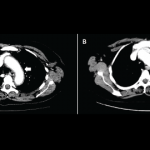NEW YORK (Reuters Health)—Eruptive keatoacanthomas and extensive panniculitus are among the dermatological conditions associated with the anticancer agent pembrolizumab, researchers say.
Pembrolizumab, a humanized IgG4 PD-1 (programmed cell death-1) antagonist antibody, is an immune checkpoint inhibitor (CPI) approved in the U.S. for treating advanced melanoma, non-small-cell lung cancer and head and neck squamous cell carcinoma.
CPI-induced sarcoidlike reactions are an emerging immune-related adverse event, according to authors of two reports in JAMA Dermatology, online May 3.1,2
In the first report, Dr. Mario Lacouture and colleagues at Memorial Sloan Kettering Cancer Center in New York describe two men and one woman (median age: 83; one with metastatic squamous cell carcinoma and the others with metastatic melanoma) who had sudden onset of multiple pembrolizumab-associated eruptive keatoacanthomas after a median of 13 months of therapy.
After treatment with clobetasol ointment, intralesional triamcinolone and superficial cryosurgery as needed, the lesions resolved and did not recur. The patients continued on pembrolizumab throughout, with complete response of their primary cancers.
In the second report, Dr. Sara Burillo-Martinez and colleagues at Universidad Comlutense in Madrid describe a woman in her 60s treated with pembrolizumab for advanced melanoma who developed panniculitis—extensive indurated subcutaneous plaques and nodules—after her third infusion.
Pembrolizumab was stopped temporarily and a tapering regimen of prednisone was initiated. This resulted in complete resolution of the panniculitis within two weeks.
After the sixth infusion, a long-standing blue nevus on the right hand became inflamed. This resolved and the patient remained in complete remission six months later.
The authors conclude that clinicians should be aware that many sarcoid-like, post-immunotherapy reactions can occur with anti-PD-1 agents, and that these reactions “must not be confused with tumor progression to avoid adversely affecting decisions on patient management.”
Dr. Laura Ferris, an associate professor of dermatology at the University of Pittsburgh in Pennsylvania, says, “It is important for oncologists and dermatologists to be aware of these side effects as these drugs are used more often to treat more patients and more types of cancer.”
“These drugs work to take the brakes off the immune response, resulting in immune-mediated tumor regression,” she tells Reuters Health by email. “However, this response is not specific to the tumor and can result in enhanced immune activation in the skin, as well.”
“The side effects were fairly easily managed and did not require interruption of cancer treatment,” she notes. “The papers highlight the importance of a multidisciplinary approach to managing these patients.”



